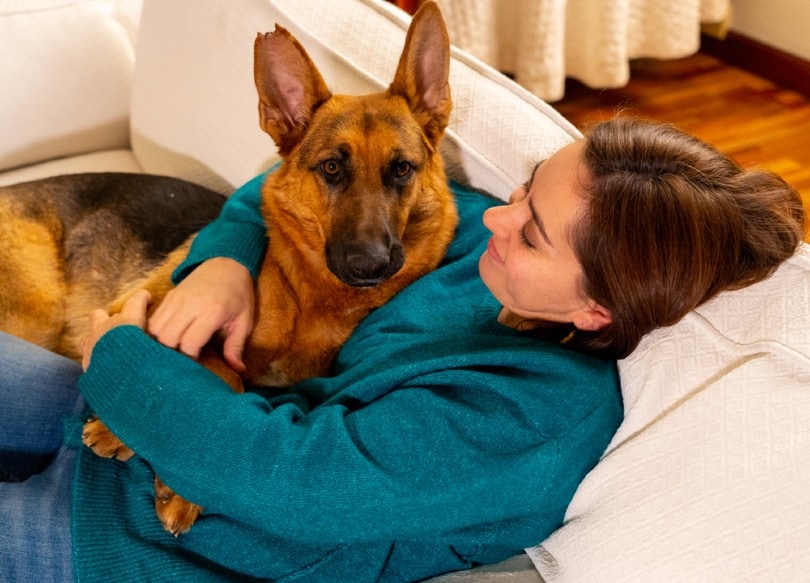Rottweiler vs German Shepherd: Which Dog to Choose?

Updated on
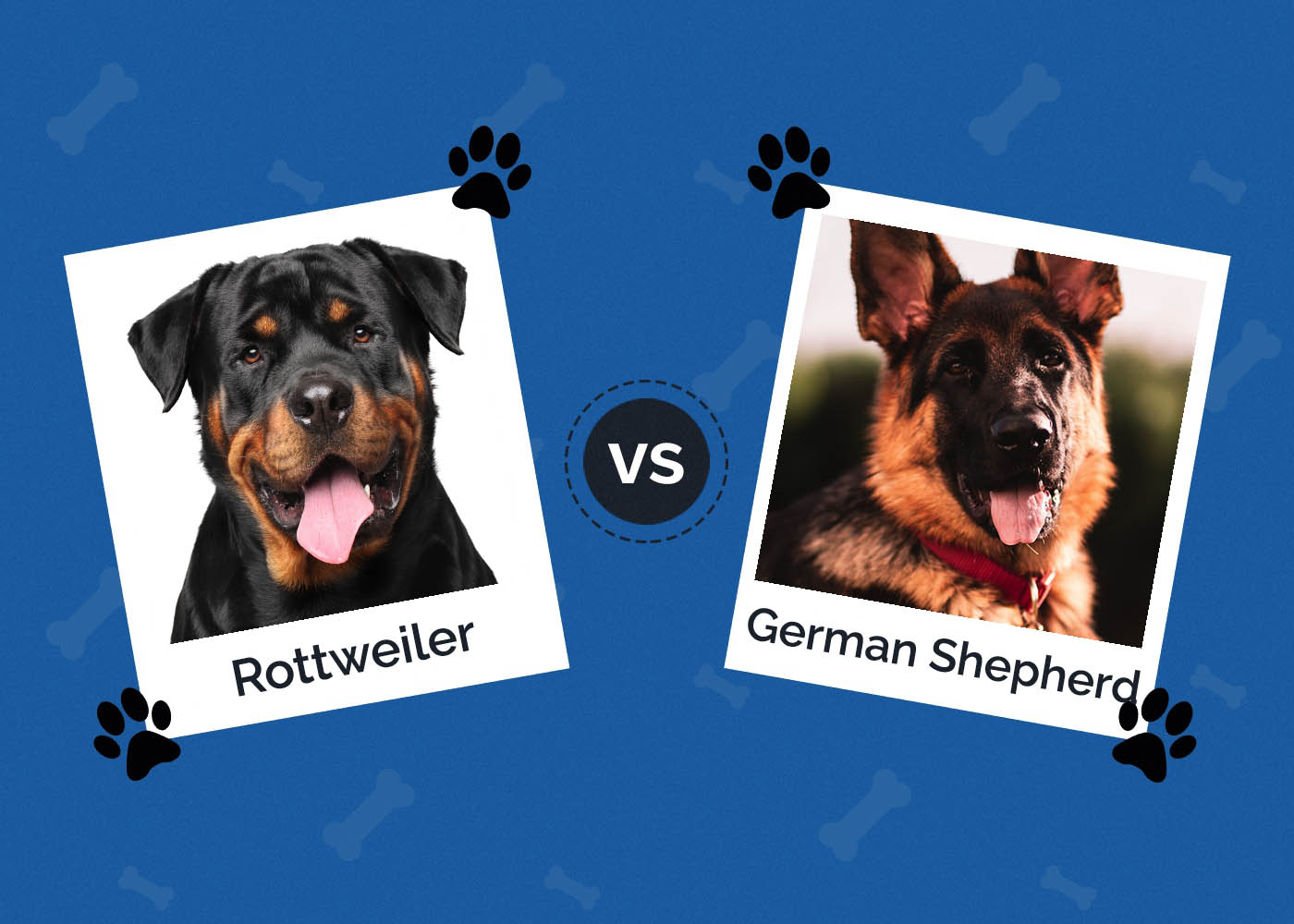
Rottweilers and German Shepherds are two of the most popular dog breeds in America — and for good reason, as they’re both intelligent, affectionate, and fiercely loyal to their owners. They make fantastic family pets as well as fearsome guard dogs — but which one is better?
We’re going to start off with a spoiler alert: we don’t think any breed is inherently better than another. However, that doesn’t mean that one might not be better than another for you.
The breeds have a lot in common, but they also have some important differences, and those distinctions could prove to be extremely important when deciding which animal to add to your pack.
Visual Difference
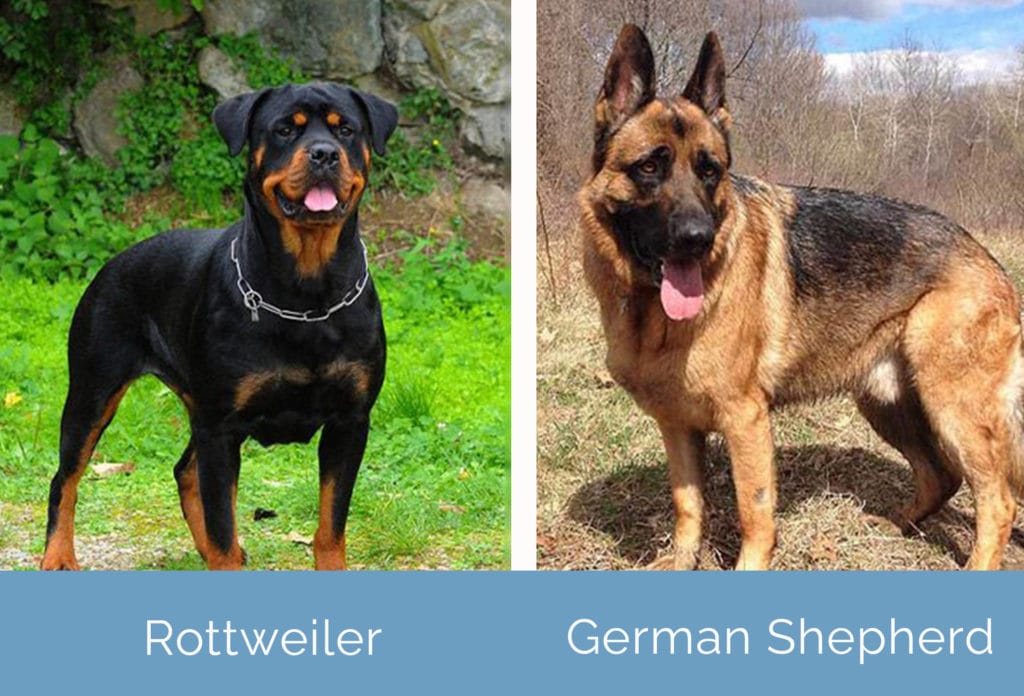
A Quick Overview – Rottweiler vs German Shepherd
The Rottweiler and the German Shepherd have a lot of similarities, but they do have their set of unique characteristics. Let’s break it down.
- Average Height (adult): 26 inches
- Average Weight (adult): 120 pounds
- Lifespan: 11 years
- Exercise: 1+ hr/day
- Grooming needs: Low
- Family-friendly: Yes
- Dog-friendly: Often
- Trainability: Moderate, highly intelligent
- Average Height (adult): 21-26 inches
- Average Weight (adult): 75-95 pounds
- Lifespan: 10-14 years
- Exercise: 2+ hours/day
- Grooming needs: High (weekly)
- Family-friendly: Yes
- Dog-friendly: Often
- Trainability: Excellent, highly intelligent
Temperament
It’s important to realize that both of these dogs were bred for specific purposes. They are both working breeds, and a strong work ethic is central to their personalities. They are also both as stubborn as you can imagine.
Rottweilers are fairly ancient dogs, and they were kept by the Romans to maintain the herds that would accompany their armies. They had to be ferocious enough to keep cattle in line, while also having enough endurance to keep up with an army on the march.
German Shepherds aren’t quite as old, as they date back to only the 19th century C.E., but they also come from a military background. They were primarily created to act as scouts and sentries at army installations. As a result, they had to be focused, dedicated, and ready to follow orders.
Their backgrounds mean that these dogs require a firm and competent hand in training. They will instinctively look to you to provide leadership, and if you’re not capable of it, they may just decide to take matters into their own paws. They’re not necessarily prone to aggression, but any dog can misbehave if he’s never been taught proper manners.
Typically, neither breed is recommended for first-time owners. You should have some experience training and leading dogs before taking on one of these headstrong breeds. Also, early socialization is absolutely critical.
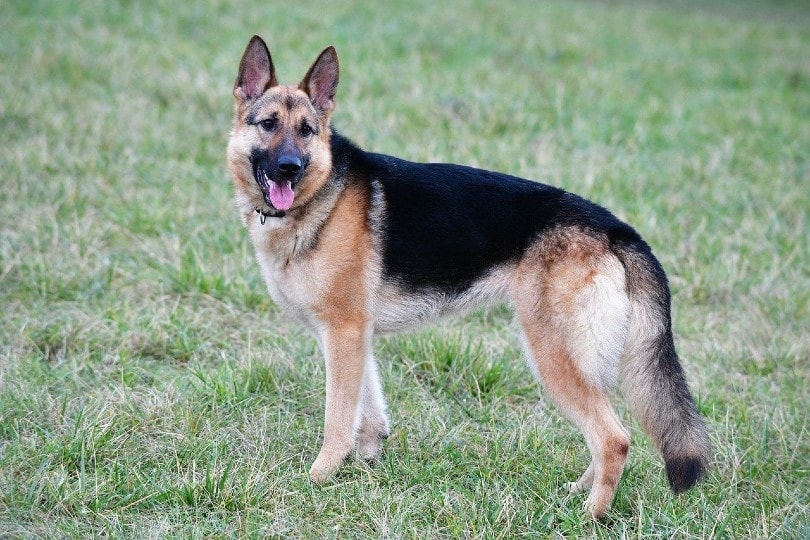
Training Styles
Both breeds respond well to positive reinforcement, but neither one is likely to tolerate negative discipline techniques like shock collars, physical aggression, or yelling.
German Shepherds are big, goofy animals, and as such, they tend to be motivated by play. You can teach a lot of important commands by incorporating them into a game or using playtime as a reward for successfully completing the training.
Rotties, on the other hand, love to eat. They tend to be extremely food-motivated, so you may have to hand over some treats if you want him to sit and stay. Be careful about being too generous with the cookies, though, because the breed can be prone to obesity.
Both are extremely intelligent, so you have to be consistent with your training practices and rigorous with your commands. German Shepherds tend to follow every command to the letter, so if you misspeak, you could have to redo some training. Rottweilers love to bend the rules, though, so you have to watch them like a hawk and not let them get away with anything.
Exercise Requirements
Once we told you that these were working dogs, you should have already known that neither one would be satisfied sitting next to you on the couch all day binge-watching Netflix.
Both these dogs need a fair amount of vigorous exercise — about an hour a day for Rottweilers, and roughly twice that much for German Shepherds. If you fail to provide it, they’ll provide it for themselves — and that could mean tearing up your couch or figuring out ways to escape the backyard.
Mental stimulation is just as important as physical exercise, and perhaps more so. They need regular training, and you should consider investing in puzzle toys and other intellectual games. Both breeds also take well to sports like agility training.
Bottom line: while neither breed is ideal for a family of couch potatoes, German Shepherds require even more activity than Rotties.
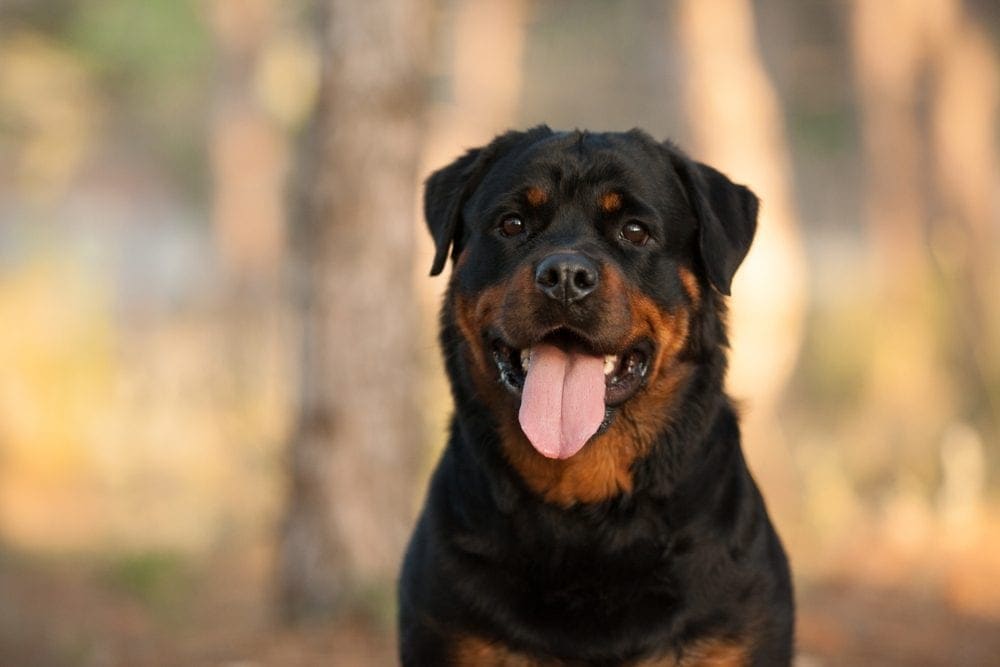
Size Differences
This is where you’ll find one of the clearest distinctions between the two breeds.
Rottweilers are big dogs. Really big. A male Rottie can easily weigh up to 135 pounds, and that doesn’t mean he’s fat, either. They have broad chests, big heads, and plenty of power packed into their bodies. That’s why it’s so important that your Rottweiler is well-trained; if he decides to ignore your commands, there might be little you can physically do to stop him.
German Shepherds are longer and leaner. They’re still plenty big — males can weigh up to 90 pounds — but they’re less likely to be able to physically dominate you. These dogs can also seem bigger than they are due to their massive coats (more on that later).
As you might expect, given their shapes and sizes, the two breeds have different physicalities as well. Rotties tend to be more grounded, whereas you’re likely to see a German Shepherd bouncing all over the place. As a result, you’ll need a strong fence to keep a Rottweiler contained and a high one to keep your German Shepherd penned up.
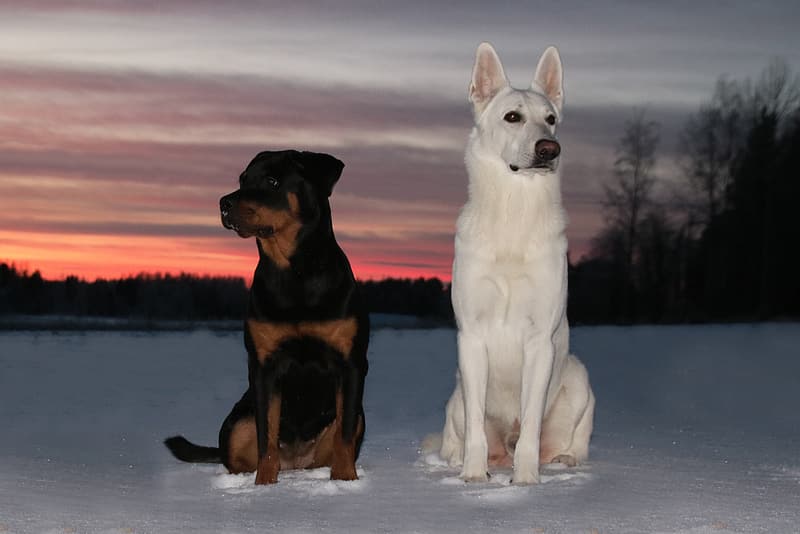
Health Issues and Lifespan
As Rottweilers are bigger dogs, they have a slightly shorter lifespan than German Shepherds: 10-12 years, compared to the latter’s 9-13 year expectancy.
Both are relatively healthy, but they do have certain ailments that they’re prone to experiencing.
For Rottweilers, obesity can be a problem. This leads to heart issues, spinal problems, hip dysplasia, and more. They’re also prone to issues with their retinas and can experience blindness late in life if not monitored closely.
German Shepherds, on the other hand, are extremely likely to suffer from hip or elbow dysplasia. They suffer arthritis at high rates as well, and degenerative disc disease is a concern due to the slope of their backs.
While you shouldn’t expect too many health problems from either breed, it’s essential to take them in for regular checkups so that you can nip any potential issues in the bud.
Intelligence
As noted earlier, these are two of the smartest dog breeds on the planet. According to neuropsychologist Stanley Coren, the author of The Intelligence of Dogs, German Shepherds are the third-smartest breed, while Rottweilers come in at ninth on the list.
That means that both breeds will be quick studies in training, and they may pick up lessons you never intended to teach.
It also means that you have to always be on your toes, as you might think that you left the peanut butter out of reach, only to find an empty jar when you wake up in the morning. Both dogs can also be accomplished escape artists if left alone in the backyard for too long.
While you might assume that smarter is automatically better when it comes to dogs, you should realize that more intelligent dogs usually require more stimulation and more dedicated training. If you’re looking for more of a hands-off pet, consider a bulldog (they’re notoriously dumb).
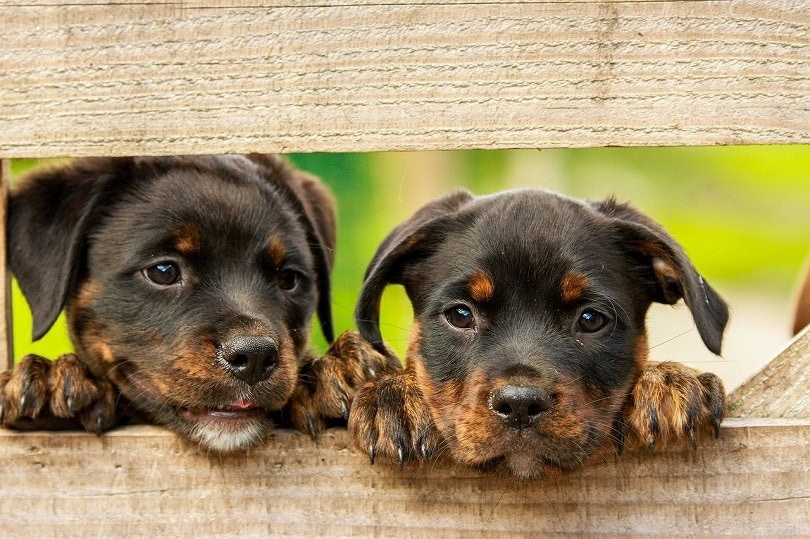
Friendliness
This is something of a touchy subject. It’s important to recognize that, while all breeds have inherent tendencies when it comes to something like friendliness, that usually pales in comparison to how well the dog is trained and socialized.
That said, both these animals are guard dogs by nature. That means that, if left to their own devices, they’ll likely be fiercely protective of your family and suspicious of outsiders. That could be exactly what you want, but if you’d like to occasionally have company over, you’ll need to train your pup.
However, when given proper socialization and training, both breeds can be extremely friendly and loving to everyone.
Be aware, however, that just because your dog is friendly doesn’t mean he’s safe; both these breeds are so big that they can easily harm a child or elderly person by accident, so teaching them proper manners is extremely important.
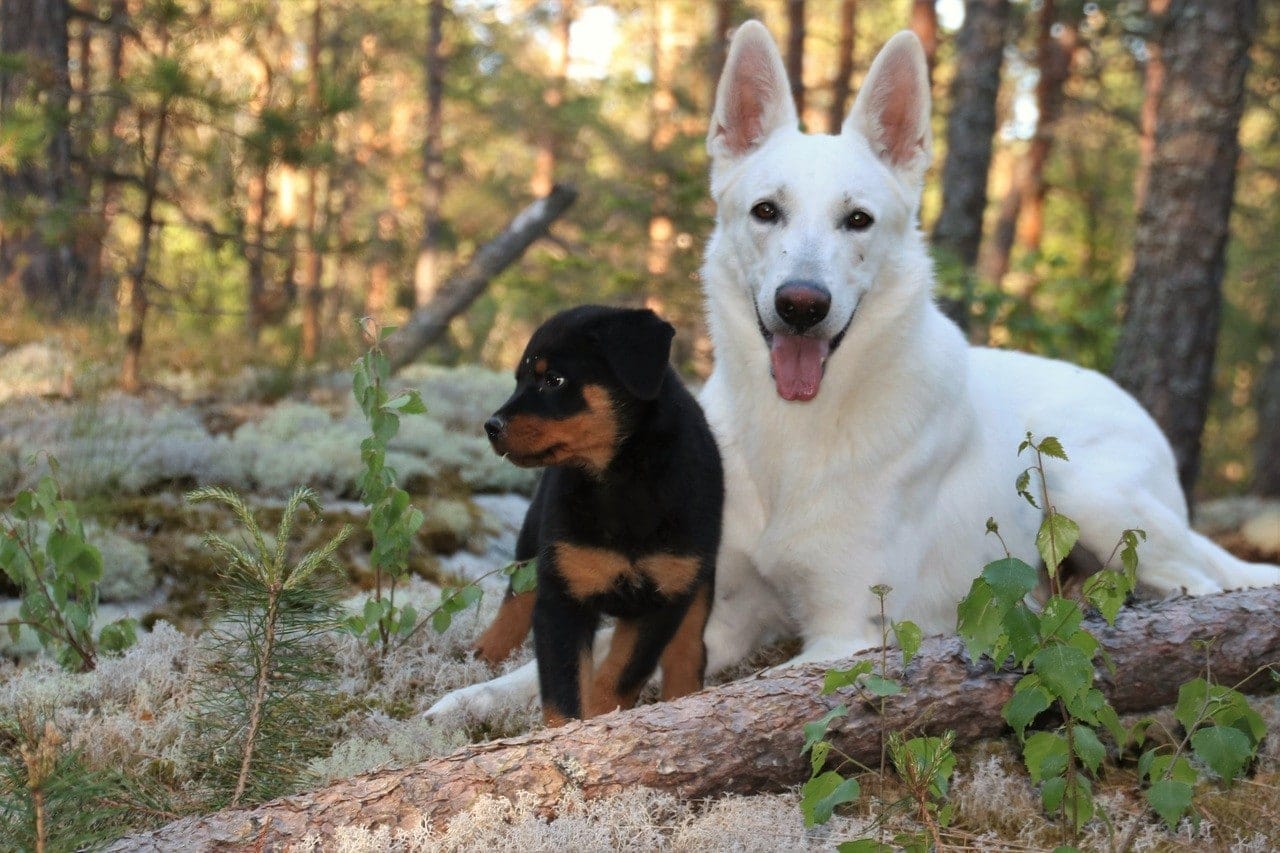
Compatibility with Other Pets
As with friendliness, this more dependent on training and socialization than anything else. At their core, however, neither breed is particularly fond of other animals.
The sad truth is that both breeds have been used as fighting dogs in the past. That doesn’t mean that they’re any more prone to aggression or biting than other breeds, but it does mean you should be wary when introducing them to other dogs.
Also, they both have fairly strong prey drives, so it might not be the best idea to bring a cat in the house. However, if you socialize them with cats while they’re puppies, both can learn to tolerate felines. In fact, Rottweilers are much more likely to tolerate cats in the house than other dogs.
Grooming Requirements
Rottweilers are fairly low-maintenance, as they have short coats and only tend to shed seasonally. As a result, you can get away with only brushing a Rottie occasionally.
German Shepherds, on the other hand, have extremely dense, long coats, and their fur gets absolutely everywhere. If you don’t want to be constantly covered in dog hair, you’ll need to brush your German Shepherd every week at least and invest in a vacuum that’s adept at picking up pet hair.
Both should be fine with only a couple baths a year, unless, of course, they find something disgusting to roll in. You’ll need to clip their nails regularly, and both can be prone to ear infections, so keeping their ears clean is essential.
Frequently Asked Questions
Which is better for families with small children?
Either the Rottweiler or German Shepherd can be perfect for families with kids — and either breed can be a disaster.
Once again, it all comes down to proper training and socialization. If you’re not willing to put in the work, you’re better off not bringing either one home.
Training and socialization aren’t just for the dogs, either. You also need to teach your kids how to behave around canines; doing so will protect them from any dogs they come across, not just your own.
Which makes for a better therapy dog?
Both are commonly used as therapy dogs, as both have the intelligence and discipline to handle any task asked of them.
If you’re planning on training the dog yourself, though, if you’re deciding between a Rottweiler vs German Shepherd, you may want to opt for a Rottweiler. They’re a little more laid-back, so you won’t have to worry about curbing an overabundance of enthusiasm.
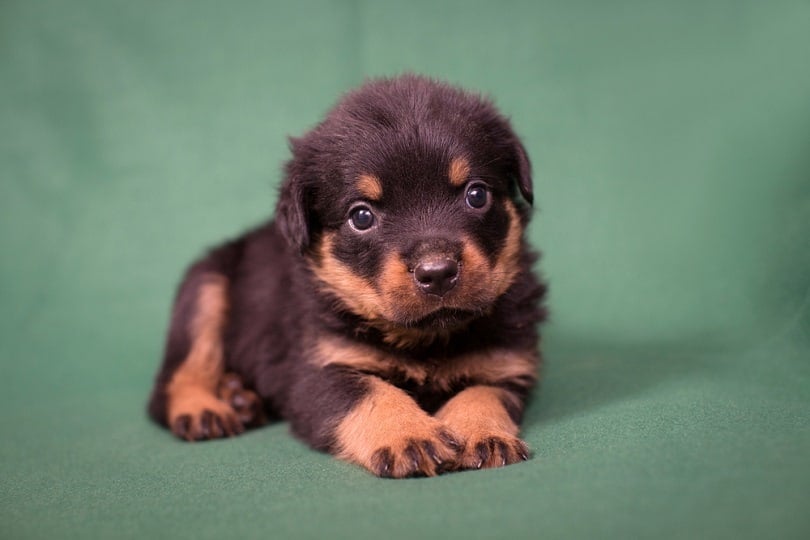
Is it true that Rottweilers growl all the time?
Let’s get one thing straight right off the bat: if a Rottweiler is growling at you, you’ll know it.
That being said, the Rottweiler is prone to making a low rumble in their throats when they’re content, almost like a cat’s purr. They can also do this when playing, and it’s commonly mistaken for a sign of aggression rather than contentment.
If you’re not sure, look for other indicators of unease, like pinned-back ears, body stiffness, rigid tail, or bared teeth. If you see any of these, stop the activity immediately and consult a licensed trainer or behavioralist.
Which breed is more expensive to own?
Rottweilers will likely cost you more in the long run, due to two primary factors: they’re slightly more likely to suffer health problems requiring costly vet visits, and they can eat. Oh, how they can eat.
Expect to spend more on dog food if you get a Rottweiler. While German Shepherds can put it away too, they can sometimes forget to eat, especially if they’re distracted by playtime. That’s why some dog owners theorize that German Shepherds actually operate via photosynthesis.
Is it true that some homeowner’s insurance policies prohibit German Shepherds and/or Rottweilers?
Sadly, yes, some places won’t allow you to keep either as a pet. However, there are plenty of others that will, so it’s important to shop around if owning one of the breeds is important to you.
If you’re renting, though, you should know that owning either type of dog will likely cause some landlords to shut their doors to you as well. While these dogs are fantastic and worth every bit of trouble they cause, they do make moving a bit of a hassle.
Which breed drools more?
If you don’t like getting slobbered on, if you’re comparing a Rottweiler vs German Shepherd, go with a German Shepherd. They don’t drool much, and they aren’t prone to licking faces.
If you welcome puppy kisses, though, Rottweilers should be your pick. They slobber like there’s no tomorrow, and they love to sneak in a lick when you least expect it.
What should I look for in a puppy?
If you want a purebred dog of either breed, chances are you’re going to need to go through a breeder. Be sure to actually visit the breeder before buying, and look for any signs that the dogs are abused or neglected.
Also, check and see how the breeder interacts with the dogs. Do they seem to love the animals, or are they seen as nuisances? This can give you clues as to how the dogs are treated when no one’s around — and if they’re abused as puppies, they’re more likely to have behavioral problems as adults.
Look for a dog that’s confident without being aggressive or overbearing and that’s friendly and welcoming to you. Bring your kids with you so you can see how it responds to children as well.
If you’re adopting from a shelter, it’ll be harder to find a purebred dog — but Rottweiler and German Shepherd mutts are pretty awesome, too.
It’s more difficult to judge an animal’s temperament in such a stressful place, but most of the same rules apply. Ask the staff there for their opinions as well (most dogs undergo temperament tests in animal shelters).
Rottweiler vs German Shepherd – Which to Choose?
The Rottweiler and German Shepherd are similar enough that it’s hard to go wrong with either one. However, if you’ve never owned a dog before or you’re not interested in the hard work of training and socialization, you should probably adopt something else that requires far less dedication (like a cactus, perhaps?).
German Shepherds are slightly less expensive to own, love to play, and take commands very literally. They also require about twice the amount of exercise and exponentially more grooming.
Rottweilers, on the other hand, are extremely powerful, food-motivated, and love to test boundaries. They require a firm hand, but if you can command their respect, they’ll follow you to the ends of the Earth.
Provided you do the hard work necessary to keep them in line, it’s extremely unlikely you’ll regret getting either a Rottweiler or German Shepherd. So, can we suggest that maybe the best dog for you is whichever one’s available at your local animal shelter?
Featured Image Credit: (L) Jagodka, Shutterstock | (R) Alexander Naglestad, Unsplash






